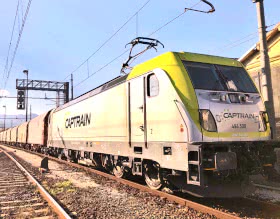
Captrain Italia, the Italian branch of the state railways French SNCF, has announced that it has returned to growth in 2022, after a two-year period 2020-2021 of substantial stagnation of traffic due the impact of the COVID pandemic on the economy and transport, having last year far exceeded the results of 2019. In 2022, In fact, the turnover reached the record value of about 120 million euros, with a growth of over +15% on the previous year. In addition, 2022 has been archived with a slight profit, after two years marked by results Negative.
 The company highlighted that in 2022 these results were achieved despite some operational difficulties and Not indifferent system: "The first months of last year - has explained Captrain Italia - they have in fact been characterized by the ANSFISA decision to limit the speed of trains on which traveled wagons with synthetic soles, a highly penalizing that has imposed an expenditure of means and personnel almost double compared to budgeted. 2022 was also marked from the exponential increase in energy costs they have made significantly increase RFI's tolls. To these difficulties Added to this is the cancellation, by the government Italian, of most of the subsidies previously paid for the rail transport, almost unique in a Europe which, at least as a target in words, instead wants to transfer to Important shares of transport currently still by road».
The company highlighted that in 2022 these results were achieved despite some operational difficulties and Not indifferent system: "The first months of last year - has explained Captrain Italia - they have in fact been characterized by the ANSFISA decision to limit the speed of trains on which traveled wagons with synthetic soles, a highly penalizing that has imposed an expenditure of means and personnel almost double compared to budgeted. 2022 was also marked from the exponential increase in energy costs they have made significantly increase RFI's tolls. To these difficulties Added to this is the cancellation, by the government Italian, of most of the subsidies previously paid for the rail transport, almost unique in a Europe which, at least as a target in words, instead wants to transfer to Important shares of transport currently still by road».
About the future prospects, the CEO of Captrain Italia, Mauro Pessano, explained that "the challenge for 2023 is about continuing and improving our path of growth, in line with the business plan, which includes Major investments: eight new locomotives ordered 494LM Traxx class manufactured by Alstom (ex Bombardier) which will arrive in 2024, in addition to the five that will be delivered to us already in the course of this year, allowing us to provide our customers increasingly efficient services. At the same time - He specified - we will have to be able to increase efficiency internally with interventions aimed at reducing costs, but without affecting the workforce, which is ours greater heritage'.